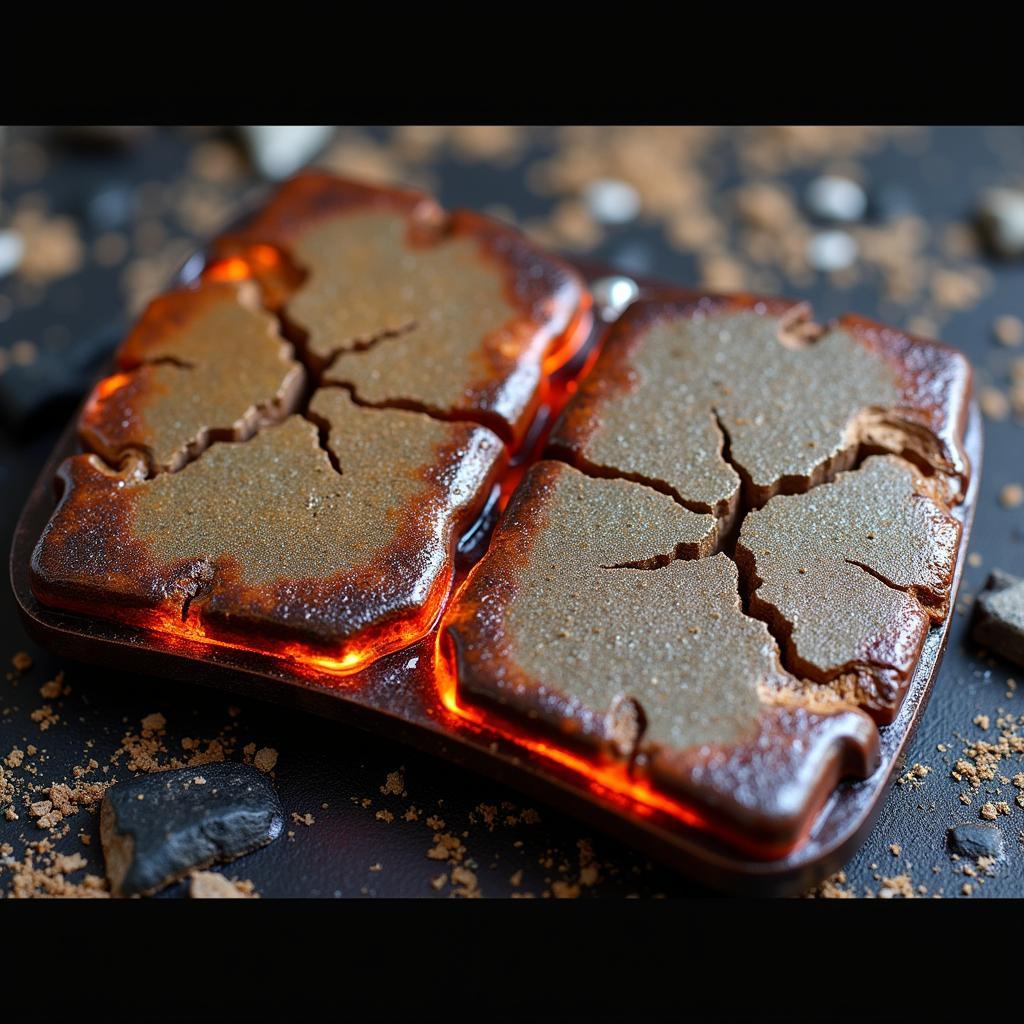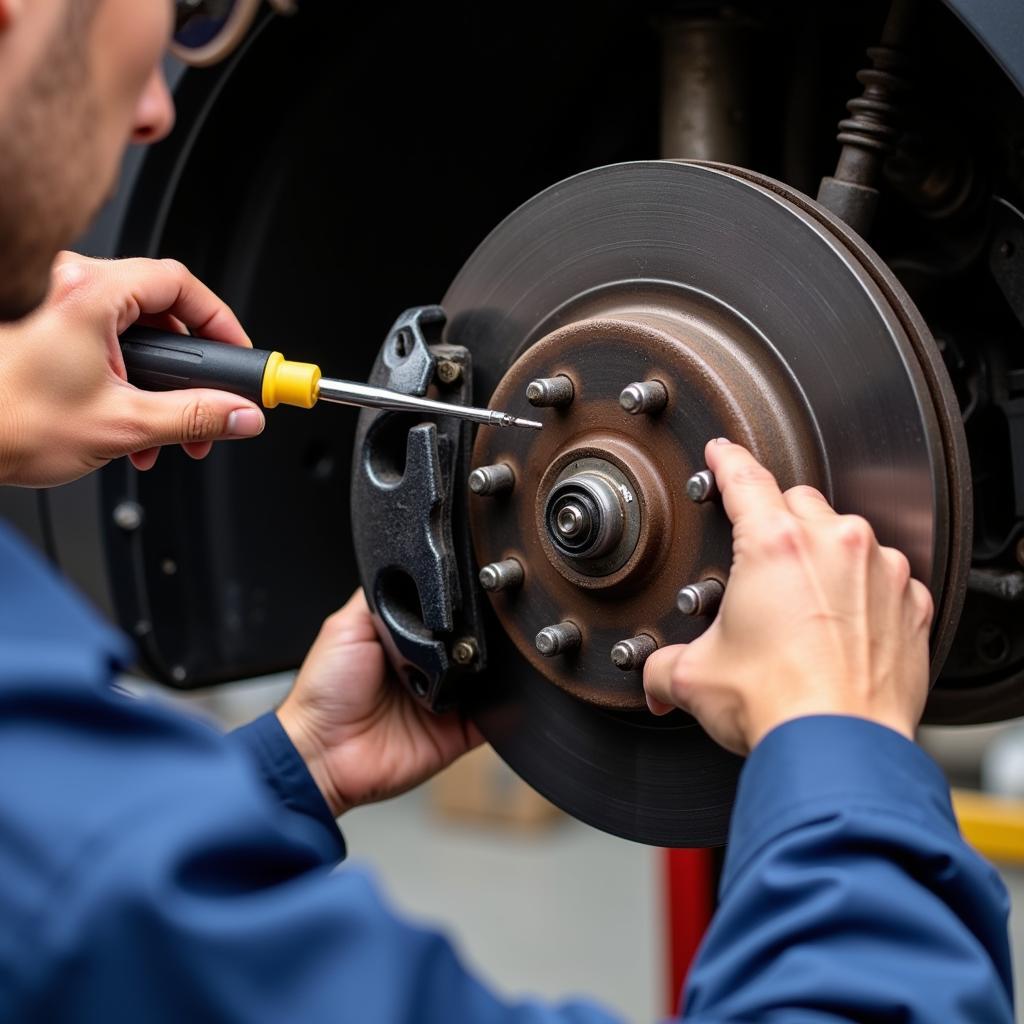You slam on the brakes after a long drive, and something smells off. It’s a distinct, acrid odor that screams “hot brakes!” Your mind might jump to worn-out calipers. But is that the real culprit behind the burning smell? Let’s dive into the world of brakes and find out.
The Science Behind Hot Brakes and That Burning Smell
Before we point fingers at the calipers, it’s essential to understand why brakes get hot and what causes that unpleasant smell. Braking is all about converting kinetic energy (motion) into thermal energy (heat). When you press the brake pedal, brake pads clamp down on the rotors, creating friction. This friction generates heat – it’s a normal part of the braking process.
The smell, however, usually indicates excessive heat. This often stems from the brake pads themselves. Most brake pads contain materials like resins, adhesives, and other components that produce an odor when overheated.
 Overheated Brake Pad
Overheated Brake Pad
Can Worn Calipers Cause Overheating?
While worn-out brake pads are often the primary suspect for hot, smelly brakes, calipers can play a role too. Here’s how:
-
Sticking Caliper Pistons: A caliper houses pistons that push the brake pads against the rotors. Over time, these pistons can become corroded or contaminated, causing them to stick. A sticking piston prevents the brake pads from fully releasing, leading to constant friction and excessive heat buildup.
-
Seized Caliper Slides: Calipers use slides or pins to move freely as the brake pads wear down. If these slides become seized or corroded, the caliper won’t apply even pressure to the brake pads. This uneven pressure can lead to one side of the brake pad wearing out faster and generating more heat.
Other Culprits Behind Hot Brakes
While calipers can contribute to overheating, other factors might be the primary culprits:
- Riding the Brakes: Continuously keeping your foot on the brake pedal, especially on long downhill stretches, generates excessive heat.
- Worn-out Brake Pads: Thin or worn brake pads offer less material to absorb and dissipate heat, making them more susceptible to overheating.
- Overloaded Vehicle: Carrying heavy loads or towing beyond your vehicle’s capacity puts extra strain on your brakes, leading to increased heat generation.
- Dragging Brakes: Besides a stuck caliper, a malfunctioning parking brake cable or issues with the brake hose can also lead to dragging brakes and overheating.
Don’t Ignore the Warning Signs
Whether it’s a worn-out caliper or another issue, ignoring hot brakes can lead to costly repairs and even dangerous situations. Here are some telltale signs that your brakes need immediate attention:
- Burning Smell: That distinct, sharp odor after braking is a clear indication of overheating.
- Spongy Brake Pedal: If your brake pedal feels soft, spongy, or goes closer to the floor than usual, it’s a sign of a potential problem within the brake system.
- Squealing or Grinding Noises: Unusual noises when applying the brakes, like squealing, grinding, or scraping, often signal worn-out pads or other brake component issues.
- Pulling to One Side: If your car veers to one side when braking, it could indicate a stuck caliper or uneven brake pad wear.
- Vibrations When Braking: A pulsing sensation in the brake pedal or steering wheel while braking might point to warped rotors, often caused by excessive heat.
Getting to the Root of the Problem
If you suspect your calipers are causing your brakes to overheat, it’s crucial to have them inspected by a qualified mechanic immediately. Here’s what they’ll likely do:
- Visual Inspection: They’ll check the calipers for signs of corrosion, damage, or leaks.
- Caliper Movement: They’ll assess the caliper piston and slides for smooth movement and retraction.
- Brake Pad Inspection: They’ll examine your brake pads for uneven wear, which can indicate a caliper issue.
Expert Insight
[Quote by a fictional expert, e.g., “A sticking caliper is like a clenched fist that won’t release. It puts constant pressure on your brake system, leading to premature wear, overheating, and potential safety hazards,” says Jake Carter, a seasoned automotive engineer with over 20 years of experience in brake system diagnostics. ]
 Brake Caliper Inspection
Brake Caliper Inspection
Conclusion
While a worn-out caliper can certainly contribute to hot, smelly brakes, it’s not always the sole culprit. Various factors can lead to overheating, and it’s vital to address the issue promptly. Regular brake maintenance, including inspections and timely replacements, can go a long way in preventing costly repairs and ensuring your safety on the road.
